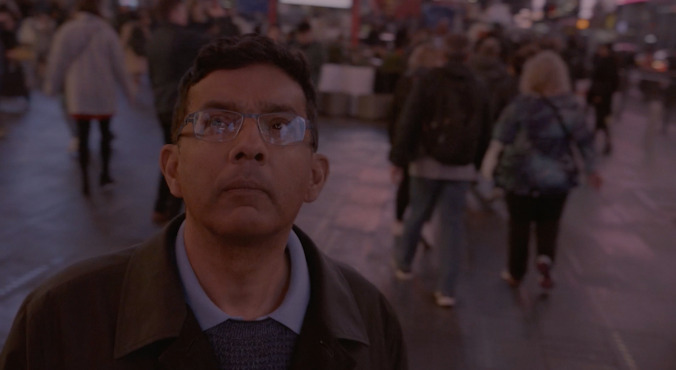George Orwell wrote over 500 essays and nine full-length books. For the purposes of the right, however, the only two that exist are Animal Farm and 1984. Trump Card opens with a scene from the latter: proletarian hero Winston Smith (Stephen Brodie) tortured by government agent O’Brien (Mark Nutter), who demands to hear, on Big Brother’s behalf, that two plus two equals five, and won’t stop turning up the electricity until Winston cracks. This is precisely how the unwavering thirty-some % who will never stop supporting Trump feel—like they’re martyrs and witnesses to obvious craziness in a society run amok, precisely the target audience for an observation like, “We’ve had gays, lesbians and bisexuals for centuries. What’s new is, this has now become an ideology.”
Trump Card, Dinesh D’Souza’s fifth biannual election season exercise in creative nonfiction filmmaking, trots out his usual array of racist dog whistles, low-production-value historical re-enactments, and interviews with a dizzying, dubious array of subjects. This round’s guests include former Trump associate George Papadopoulos, who served 12 days in federal prison for lying to the FBI about his contact with Russia on his boss’s behalf, and C-list conspiracy nut Larry Sinclair, who gets another chance to trot out his claims that “I performed oral sex on Barack Obama, [who] came back for seconds.”
D’Souza begins by expanding on the premise of the poster for 2018’s Death Of A Nation, in which Abraham Lincoln and Donald Trump were two halves of a nightmare Two-Face. Over footage of Lincoln (D’Souza stock company regular Don Taylor) riding a train, the thesis is established: “We are in a cold Civil War, one that reminds us of the crisis Abraham Lincoln faced,” D’Souza pronounces. Once again, the country is split in two—few would disagree on that diagnosis, but what’s the reason? Because “one party wants to keep the founding principles, the other party wants to move in a socialist direction.” The opening half-hour is a free-floating delirium veering from one talking point to another, mediated by D’Souza’s narration and on-camera shots of him looking pensive. The tone settles down after that, easing into a series of mostly dull interviews, but there’s still plenty of conservative camp along the way, like the animated image of George Soros pulling a KKK hood over his head.
D’Souza’s voice has merged with his subject’s, who’s actually his master: He includes a re-enactment of receiving the phone call from Trump informing him of his presidential pardon. “I want you to have your life back,” Trump (the voice of John Di Domenico) tells D’Souza. “You’ve been a great voice for freedom in America.” D’Souza’s narration is at times distinctly Trumpian, as when he announces that “the American Revolution was the most successful revolution ever made.” Mirroring his subject’s nepotism, D’Souza makes time on the soundtrack per usual for another patriotic song with vocals courtesy of wife (and now co-director) Debbie, and introduces a new member of the family: Danielle D’Souza Gill, who he interviews on the subject of abortion and who conveniently has a book out on that very topic this week. Given that D’Souza’s past films have been screened by local chapters of the RNC, he’s effectively making official GOP propaganda. (Ted Cruz is among those given special thanks in the end credits.)
Trump Card was originally scheduled for theatrical release in September, and its delayed launch has given the team just enough time to incorporate the pandemic (“We got an early glimpse of what socialism looks like during the coronavirus shutdown”). If this is D’Souza’s most up-to-date film by default, it’s still preoccupied with the increasingly arcane talking points he’s been flogging on screen since 2016: Obama’s America, returning to Orwell again at the end. By this point, D’Souza is unconvincingly frothing on the soundtrack about how “the socialist left and the Democrats want to make us grovel” and “make us worms,” but the whole premise is, predictably, a radical, cynical misunderstanding of Orwell. If the charge is that the power to rewrite history into falsehood is a hallmark of totalitarianism, then Trump Card is an example of that very impulse in action, not a response to it. Events, however, are moving even faster than D’Souza could incorporate them, and while his “COVID as trial-run for socialist tyranny” appeals to the conspiracy-minded are certainly up to the moment, the spectacle of an infected president telling the nation to watch him get a medical exam live on TV, on a Friday night, is actually far stranger and more outlandish than anything D’Souza could dream up.


 Keep scrolling for more great stories.
Keep scrolling for more great stories.